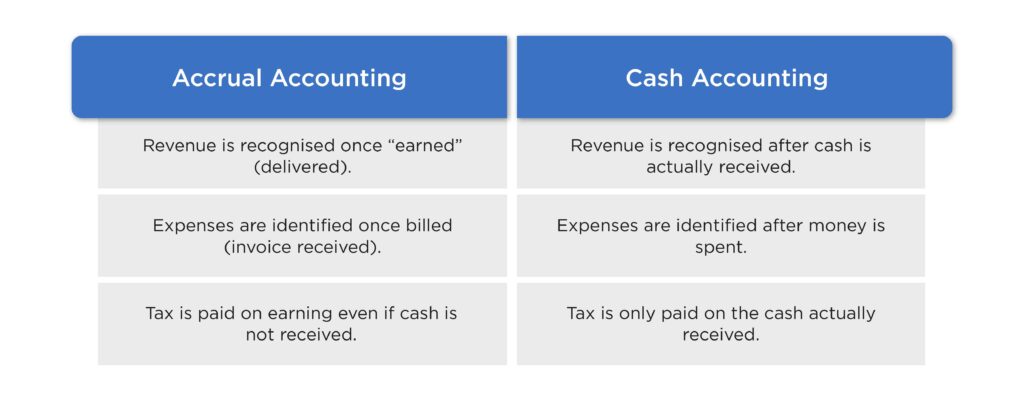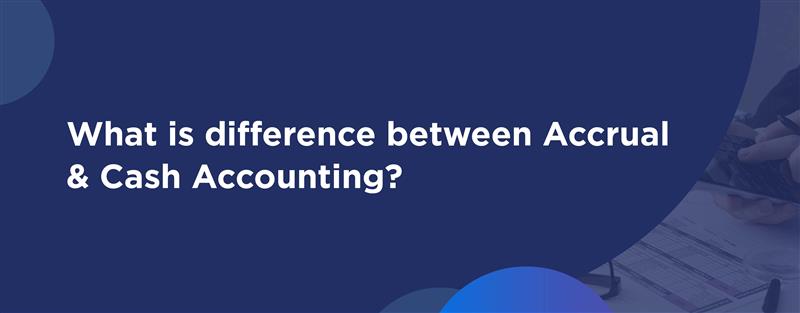Struggling to track your business cash flow accurately or match expenses with the income they generate? Many small business owners face confusion choosing between accrual accounting vs cash accounting methods, which directly affects financial reporting accuracy and decision-making.
These two accounting basis approaches, cash basis accounting (recording transactions only when money changes hands) and accrual basis accounting (recognising revenue and expenses when earned or incurred), impact your profit picture, compliance and growth planning.
The right choice hinges on your business size, structure, financial complexity and turnover thresholds like Australia’s $10 million limit for cash basis eligibility in 2025.
With ATO guidelines emphasising proper accounting methods for GST and reporting, understanding accrual vs cash accounting differences is essential for small businesses, sole traders and growing enterprises to ensure accurate financial insights and regulatory compliance.
From April 2024, HMRC presumes businesses use cash basis unless they elect accrual accounting. This makes understanding both methods essential.
In this guide, we’ll discuss:
- What cash accounting is and how it works
- What accrual accounting is and how it works
- Key differences between the two methods with real-life examples
- Advantages, disadvantages and compliance requirements
- Guidance on which method suits different business types
What is Cash Accounting?
Cash accounting is a method where businesses record income only when payment is received and expenses only when bills are paid.
Also known as cash-basis accounting, it is popular among small businesses for its simplicity and ease of use. Only actual cash transactions are recorded, there is no tracking of unpaid invoices or bills, making it easy to monitor cash flow and manage day-to-day finances.
Cash accounting is best for businesses with simple transaction structures and those seeking straightforward financial management.
How Cash Accounting method works?
The cash accounting method follows these principles:
- Record income when cash is received
- Record expenses when payments are made
- No tracking of unpaid invoices or bills
- Focus on actual cash flow
What is cash accounting in practice? Imagine selling £1,000 worth of services in March. You only record this income when the customer pays in April.
Similarly, if you buy equipment in December but pay in January, you record the expense in January’s accounts.
Cash accounting provides a clear view of actual cash flow, making it simpler for small businesses to manage their finances. However, it may not provide a full picture of financial health since it excludes outstanding receivables and payables.
What is Accrual Accounting?
Accrual accounting records transactions when they occur, regardless of payment timing. This provides a complete financial picture.
The accrual accounting method matches income with related expenses in the same period. This gives better insight into business performance.
What is accrual accounting exactly? It recognises economic events as they happen, not when cash moves.
What is accrual accounting in practice?
Imagine completing a £1,000 project in March but receiving payment in April. Accrual accounting records the income in March’s accounts, reflecting when the work was done, not when payment arrived.
Similarly, if you incur an expense in December but pay in January, the expense is recorded in December.
Accrual accounting provides a more accurate view of financial health, especially for businesses with credit sales or purchases, by tracking all financial obligations and resources. It is commonly used by larger businesses and those required to comply with accounting standards.
How the Accruals basis of Accounting functions
The accruals basis of accounting operates on these principles:
- Income recorded when earned
- Expenses recorded when incurred
- Tracks outstanding invoices and unpaid bills
- Matches revenues with related costs
Using our previous example, a £1,000 March sale appears in March accounts. Payment timing doesn’t affect when it’s recorded.
Accrual accounting provides a more accurate view of financial health, especially for businesses with credit sales or purchases, by tracking all financial obligations and resources. It is commonly used by larger businesses and those required to comply with accounting standards, particularly those with an annual turnover above $10 million.
Key differences between Cash vs Accrual Accounting

The following table summarizes the main distinctions between cash and accrual accounting methods across key accounting aspects.
| Aspect | Cash Accounting | Accrual Accounting |
|---|---|---|
| Income Recognition | When payment received | When service provided |
| Expense Recording | When bill paid | When cost incurred |
| Financial Picture | Current cash position | Complete business performance |
| Complexity | Simple to manage | More detailed tracking |
| Suitable For | Small businesses | Growing/larger businesses |
Accrual Accounting Example
ABC Consulting completes a £5,000 project in December 2024. The client pays in February 2025.
Accrual accounting records:
- December 2024: £5,000 income
- Associated project costs in December
- Outstanding receivable until payment
Cash Accounting Example
The same ABC Consulting transaction under cash accounting:
- December 2024: No income recorded
- February 2025: £5,000 income recorded
- Expenses recorded when actually paid
This shows how accrual accounting provides a more accurate view of when income is earned and expenses are incurred, helping businesses better match revenues and costs in the correct period. In contrast, cash accounting focuses on actual cash flow timing, which may delay income and expense recognition but simplifies bookkeeping.
Who Should Use Each Method?
Cash or Accrual Accounting for Small Businesses
The cash basis is now the default method for preparing accounts. Most sole traders and small partnerships benefit from cash accounting.
Cash or accrual accounting choice depends on:
- Annual turnover levels
- Business complexity
- Future growth plans
- Investor requirements
When Cash Basis is Suitable
Cash basis works well for:
- Sole traders and small partnerships
- Service-based businesses
- Simple transaction structures
- Businesses wanting straightforward bookkeeping
Note: Eligible small businesses can use the cash basis method if their aggregated annual turnover is below $10 million. This threshold applies to both GST and general accounting purposes in Australia for 2025.
When Accrual Basis is Required
Accrual accounting is mandatory for some businesses, except for VAT where cash basis can be used.
Required for:
- Limited companies
- Businesses over certain turnover thresholds
- Those seeking investment
- Complex business structures
Note: Businesses with an annual turnover above $10 million must use accrual accounting for GST and financial reporting. This requirement ensures compliance with Australian accounting standards and supports better financial transparency.
Choosing between cash and accrual accounting should consider current business size, complexity and future growth plans to ensure proper financial management and compliance with regulations.
Australia Legal Requirements and Changes
Cash Basis Changes 2025
This measure took effect from April 2024, with the first accounting year being the 2024/25 period.
Key changes include:
- Cash basis becomes the default method
- Removal of previous restrictions on its use
- Greater flexibility for businesses in choosing accounting methods
Cash accounting considerations
A business can use cash accounting if it is registered for certain sales-based charges and its estimated turnover is $10 million or less.
From 1 July 2025, businesses with a turnover above $10 million or GST turnover above $2 million must use the accrual basis for GST accounting.
Cash accounting for these charges on sales works differently from the approach used for income reporting. A business can choose different methods for each.
ATO guidelines in 2025 clarify that hybrid (modified cash) methods are acceptable for management and internal reporting, as long as statutory accounts comply with accepted standards.
These options make it simpler to prepare accounts and give flexibility to select the method that suits how the business operates.
Accounting Methods Cash vs Accrual: Advantages and Disadvantages
Cash Accounting Benefits
| Advantage | Description |
|---|---|
| Simplicity | Easy to understand and implement |
| Cash Flow Focus | Clear picture of available funds |
| Lower Costs | Minimal bookkeeping requirements |
| Flexibility for Small Operations | Helpful for freelancers and sole traders with simple transactions |
Cash Accounting Limitations
| Disadvantage | Description |
|---|---|
| Limited Insight | Doesn’t show complete business picture |
| Growth Challenges | Less suitable for expanding businesses |
| Loan Difficulties | Banks prefer accrual accounts |
| Planning Issues | Harder to forecast future performance |
| May Delay Income Recognition | Income recorded only when received, skewing short-term results |
| Not GAAP Compliant | Generally doesn’t comply with formal accounting standards |
Accrual Accounting Benefits
| Advantage | Description |
|---|---|
| Complete Picture | Shows true business performance |
| Better Planning | Enables accurate forecasting |
| Professional Image | More credible with stakeholders |
| Growth Ready | Suitable for expanding businesses |
| Compliance with Standards | Meets GAAP/IFRS requirements |
| Improved Cash Management | Tracks receivables and payables for pending cash flow |
Accrual Accounting Limitations
| Disadvantage | Description |
|---|---|
| Complexity | Requires more detailed record-keeping |
| Higher Costs | More expensive to maintain |
| Professional Help | Often requires accountant support |
| Requires Skilled Management | Needs knowledgeable personnel or accountants |
| More Time-Consuming | Increased administrative work can delay reporting |
Switching Between Methods
Can You Change Accounting Methods?
Yes, businesses can switch between cash or accrual accounting methods. However, this requires careful planning and HMRC notification to the relevant regulatory authority.
Switching considerations:
- Tax implications of the change
- Timing of the switch
- Professional advice recommended
- Record-keeping adjustments needed
Accrual Versus Cash Basis of Accounting: Making the Switch
Changes came into force on 6 April 2024, the beginning of the 2024/25 accounting period.
The process involves:
- Deciding on the optimal timing for the change
- Calculating any transitional adjustments needed
- Updating accounting and record-keeping systems
- Notifying HMRC of the change
Practical Implementation of Cash vs. Accruals Accounting
Setting Up Cash Accounting
For cash basis accounting, the requirements include:
- Simple income and expense tracking
- Bank statement reconciliation
- Receipt and invoice filing
- Basic spreadsheet or bookkeeping and accounting software
Setting Up Accrual Accounting
Accrual basis assumption requires more sophisticated systems:
- Accounts receivable tracking
- Accounts payable management
- Prepayment and accrual calculations
- Professional accounting and bookkeeping software
Note: Cash basis accounting records transactions only when cash is received or paid, unlike accrual accounting which tracks transactions when they are incurred regardless of cash flow.
Software to Implement in Cash vs Accrual Accounting
Cash Accounting Software
Popular options include:
- Sage Business Cloud Accounting
- QuickBooks Online Simple Start
- FreeAgent (cash basis mode)
- Xero Starter (simplified features)
Accrual Accounting Software
Comprehensive solutions include:
- Sage Business Cloud Enterprise
- QuickBooks Online Advanced
- Xero Premium
- KashFlow Professional
Record-Keeping Requirements
Cash Basis Records
Accurate and detailed record-keeping is important in cash basis accounting, even though it seems simple.
Maintain:
- All income receipts
- Expense payments and receipts
- Bank statements
- Petty cash records
Accrual Basis Records
Additional requirements include:
- Outstanding invoice lists
- Unpaid bill schedules
- Accrual and prepayment calculations
- Month-end adjustment records
Best Accounting Methods for Australian Businesses
While this guide focuses on Aus rules, similar principles apply globally. The choice between methods depends on:
- Business size and complexity
- Regulatory requirements
- Industry standards
- Growth objectives
Professional Advice and Support
When to Seek Help
Consider professional assistance when:
- Starting a new business
- Switching accounting methods
- Facing complex transactions
- Preparing for growth or investment
Types of Professional Support
Available help includes:
- Qualified accountants
- Bookkeeping services
- Business consultants
- Financial software specialists who assist with implementing and optimizing accounting systems, especially for accrual accounting
Professional support like Outsourcing accounting and bookkeeping services can help businesses improve financial reporting accuracy and support strategic decision-making beyond critical transition points.
Future-Proofing Your Choice
Planning for Growth
Consider future needs when choosing between accrual accounting vs cash accounting:
- Anticipated turnover growth
- Potential investors or lenders
- Business structure changes
- Market expansion plans
Regular Reviews
Assess your accounting method annually:
- Business performance changes
- New regulatory requirements
- Technology improvements
- Cost-benefit analysis
Accrual Accounting vs Cash Accounting for Businesses: Decision Framework
Use this framework to choose the right method:
Step 1: Assess Current Situation
- Calculate annual turnover
- Evaluate business complexity
- Consider cash flow patterns
- Review regulatory requirements
Step 2: Consider Future Plans
- Growth projections
- Investment needs
- Market expansion
- Structure changes
Step 3: Evaluate Resources
- Available time for bookkeeping
- Professional support budget
- Technology capabilities
- Staff expertise
Step 4: Make Informed Decision
- Compare method benefits
- Calculate implementation costs
- Plan transition if needed
- Set review schedule
Common Mistakes to Avoid
Cash Accounting Pitfalls
- Ignoring unpaid invoices in planning
- Mixing personal and business transactions
- Poor record-keeping despite simplicity
Accrual Accounting Errors
- Inconsistent cut-off procedures
- Missing accrual calculations
- Inadequate supporting documentation
- Complex adjustments without help
Compliance and Audit Considerations
HMRC Requirements
Both methods must comply with:
- Accurate record maintenance
- Timely tax return filing
- Supporting documentation
- Consistent application
Audit Readiness
Maintain audit trails through:
- Complete transaction records
- Regular reconciliations
- Document retention policies
- Professional review processes
Technology and Automation
Modern Accounting Solutions
Today’s software offers:
- Automatic bank feeds
- Receipt scanning capabilities
- Real-time reporting
- Cloud-based accessibility
Integration Benefits
Connected systems provide:
- Reduced manual entry
- Improved accuracy
- Time savings
- Better insights
Conclusion
The choice between accrual accounting vs cash accounting significantly impacts your business operations. Cash accounting offers simplicity but limited insight.
Accrual accounting provides comprehensive financial pictures but requires more effort. Consider your business size, complexity and future plans.
From April 2024, HMRC will presume that a business is using cash basis accounting unless the owner makes an election to use accruals basis. This change emphasises the importance of making an informed choice.
For 2025, remember that businesses with a turnover above $10 million must use accrual accounting for GST and financial reporting, while those below this threshold can continue using cash accounting if it suits their operations. Always ensure your records and reporting align with the latest ATO requirements for the current financial year.
Regular reviews ensure your chosen method continues serving your business needs. Professional advice helps navigate complex decisions and changes.
Frequently Asked Questions
Parul is a content specialist with expertise in accounting industry. Her writing covers a wide range of domains such as, Accounts Payable, Accounts Receivables, Bookkeeping and more. She writes well-researched content and has a strong understanding of accounting terms and industry-specific terminologies. As a subject matter expert, she simplifies complex concepts into clear, practical insights, helping businesses with accurate tips and solutions to make informed decisions.







